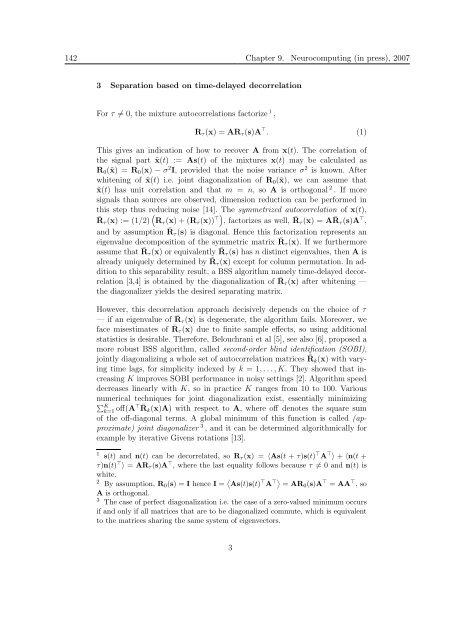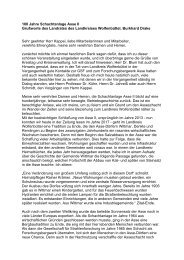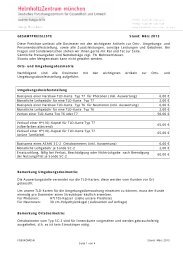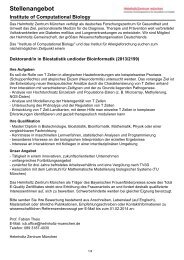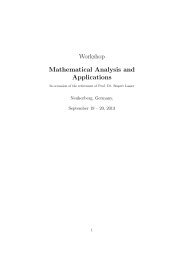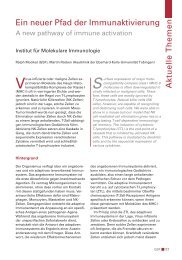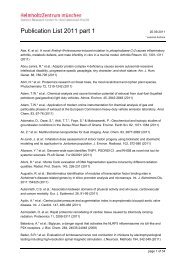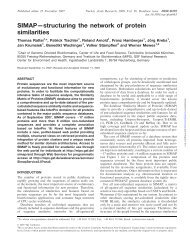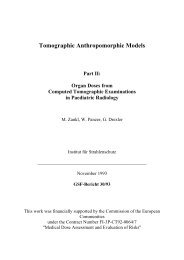Mathematics in Independent Component Analysis
Mathematics in Independent Component Analysis
Mathematics in Independent Component Analysis
You also want an ePaper? Increase the reach of your titles
YUMPU automatically turns print PDFs into web optimized ePapers that Google loves.
142 Chapter 9. Neurocomput<strong>in</strong>g (<strong>in</strong> press), 2007<br />
3 Separation based on time-delayed decorrelation<br />
For τ �= 0, the mixture autocorrelations factorize 1 ,<br />
Rτ(x) = ARτ(s)A ⊤ . (1)<br />
This gives an <strong>in</strong>dication of how to recover A from x(t). The correlation of<br />
the signal part ˜x(t) := As(t) of the mixtures x(t) may be calculated as<br />
R0(˜x) = R0(x) − σ2I, provided that the noise variance σ2 is known. After<br />
whiten<strong>in</strong>g of ˜x(t) i.e. jo<strong>in</strong>t diagonalization of R0(˜x), we can assume that<br />
˜x(t) has unit correlation and that m = n, so A is orthogonal 2 . If more<br />
signals than sources are observed, dimension reduction can be performed <strong>in</strong><br />
this step thus reduc<strong>in</strong>g noise [14]. The symmetrized autocorrelation of x(t),<br />
¯Rτ(x) := (1/2) �<br />
Rτ(x) + (Rτ(x)) ⊤�,<br />
factorizes as well, ¯ Rτ(x) = A ¯ Rτ(s)A⊤ ,<br />
and by assumption ¯ Rτ(s) is diagonal. Hence this factorization represents an<br />
eigenvalue decomposition of the symmetric matrix ¯ Rτ(x). If we furthermore<br />
assume that ¯ Rτ(x) or equivalently ¯ Rτ(s) has n dist<strong>in</strong>ct eigenvalues, then A is<br />
already uniquely determ<strong>in</strong>ed by ¯ Rτ(x) except for column permutation. In addition<br />
to this separability result, a BSS algorithm namely time-delayed decorrelation<br />
[3,4] is obta<strong>in</strong>ed by the diagonalization of ¯ Rτ(x) after whiten<strong>in</strong>g —<br />
the diagonalizer yields the desired separat<strong>in</strong>g matrix.<br />
However, this decorrelation approach decisively depends on the choice of τ<br />
— if an eigenvalue of ¯ Rτ(x) is degenerate, the algorithm fails. Moreover, we<br />
face misestimates of ¯ Rτ(x) due to f<strong>in</strong>ite sample effects, so us<strong>in</strong>g additional<br />
statistics is desirable. Therefore, Belouchrani et al [5], see also [6], proposed a<br />
more robust BSS algorithm, called second-order bl<strong>in</strong>d identification (SOBI),<br />
jo<strong>in</strong>tly diagonaliz<strong>in</strong>g a whole set of autocorrelation matrices ¯ Rk(x) with vary<strong>in</strong>g<br />
time lags, for simplicity <strong>in</strong>dexed by k = 1, . . .,K. They showed that <strong>in</strong>creas<strong>in</strong>g<br />
K improves SOBI performance <strong>in</strong> noisy sett<strong>in</strong>gs [2]. Algorithm speed<br />
decreases l<strong>in</strong>early with K, so <strong>in</strong> practice K ranges from 10 to 100. Various<br />
numerical techniques for jo<strong>in</strong>t diagonalization exist, essentially m<strong>in</strong>imiz<strong>in</strong>g<br />
� Kk=1 off(A ⊤ ¯ Rk(x)A) with respect to A, where off denotes the square sum<br />
of the off-diagonal terms. A global m<strong>in</strong>imum of this function is called (approximate)<br />
jo<strong>in</strong>t diagonalizer 3 , and it can be determ<strong>in</strong>ed algorithmically for<br />
example by iterative Givens rotations [13].<br />
1 s(t) and n(t) can be decorrelated, so Rτ(x) = 〈As(t + τ)s(t) ⊤A⊤ 〉 + 〈n(t +<br />
τ)n(t) ⊤ 〉 = ARτ(s)A⊤ , where the last equality follows because τ �= 0 and n(t) is<br />
white.<br />
2 By assumption, R0(s) = I hence I = � As(t)s(t) ⊤A⊤� = AR0(s)A⊤ = AA⊤ , so<br />
A is orthogonal.<br />
3 The case of perfect diagonalization i.e. the case of a zero-valued m<strong>in</strong>imum occurs<br />
if and only if all matrices that are to be diagonalized commute, which is equivalent<br />
to the matrices shar<strong>in</strong>g the same system of eigenvectors.<br />
3


